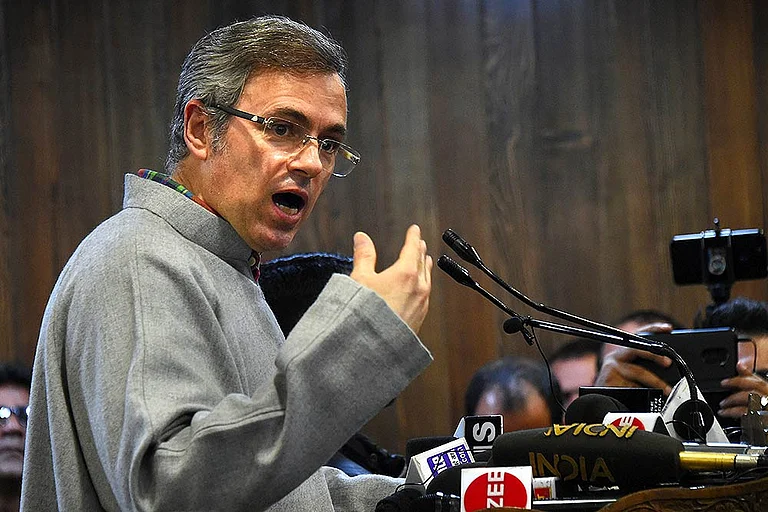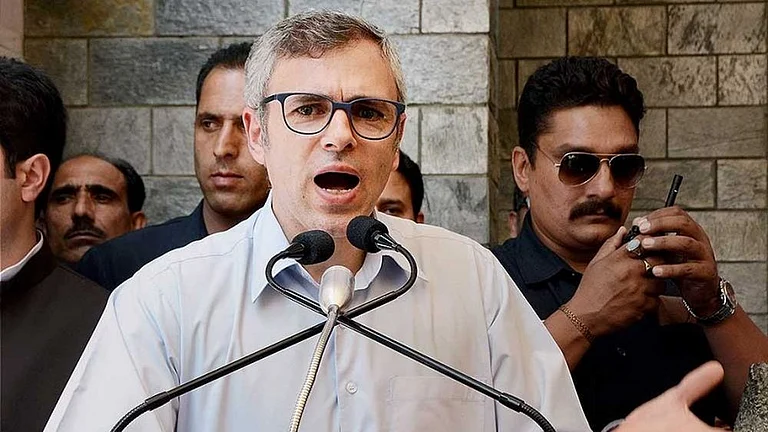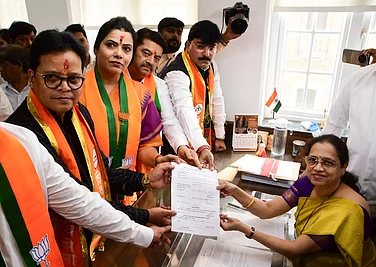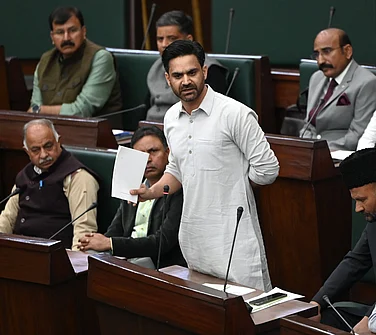
This story was first published as part of the magazine issue titled 'The Silence Of Kashmir' published in June 2024.
The abrogation of Article 370 that removed the special status of the state of Jammu and Kashmir (J&K), along with the political devaluation of the state to a Union Territory was done on the pretext of ushering in a ‘new dawn’ for the region, or as they called it, “Naya Kashmir”. This tall claim relied on a presumptuous idea that Article 370 had been the root of all problems in J&K, a misinformed narrative that has long been propagated by the Bharatiya Janata Party (BJP).
In order to gain popular legitimacy for this undemocratic act, all media outlets and journalists reporting dissent from the ground were either banned, incarcerated or muzzled using extensive executive powers. This false perception is belied by the enormous challenges that the BJP faced when it struggled to find even three electoral candidates to reiterate and uphold their narrative in Kashmir Valley.
Decisions regarding the political status of J&K were met with outspoken dissent and disagreement by all political parties in the region and this became their second-biggest challenge. Even their own party in J&K held protests against the changes and the weak political economic position of the region post-abrogation. In order to address the difficulty of finding malleable and agreeable voices within J&K, it was decided that the most effective path forward would be to completely silence any and all dissent and disagreement, thereby manufacturing an eerie vacuum of opinion and thought coming out from the state. This would then give space for a concocted, planted and false narrative to fill the void and exist in isolation, deeming it to be irrefutable and the gospel truth. As the famous adage goes, “When truth is replaced by silence, the silence is a lie.”
The silence of voices from J&K cannot wash over the fact that the abrogation of Article 370 was done in a despotic, tyrannical and undemocratic manner with absolutely no regard for the civil liberties and fundamental rights of its citizens, let alone the principles of representative democracy. On the eve of abrogation, political leaders, including three former chief ministers and innumerable other political and social figures, were detained, mostly on questionable legal basis. News agencies in the region, which refused to push the narrative of the BJP, were banned.
Some journalists who refused to bend to the might of the government found themselves charged under the draconian Unlawful Activities (Prevention) Act (UAPA). Social media platforms, which became a powerful space for counter speech, were blocked and its operators penalised through severe surveillance and censorship.
A complete information blockade was put in place by the government on the internet and cellular connectivity, both incoming and outgoing cellular traffic. All these measures were systematically implemented to create a manufactured silence that stifled independent thought and dissent. If the step taken to abrogate 370 was done for the people of J&K, why was it done while muzzling the voices of those very people from the state?
On the eve of abrogation, political leaders, including three former CMS, and innumerable other political and social figures, were detained, mostly on questionable legal basis.
With assembly elections on the horizon as mandated by the Supreme Court of India, the BJP government is struck by a new sense of desperation to keep the local, popular voices from J&K under lock and key. To this end, the government is devising and implementing newer, more stringent techniques, whereby the latest method added to an already existing extensive arsenal of oppression is the blanket ban on government employment for the family members of suspected stone pelters and militants.
This policy, recently announced by the Union home minister, is highly problematic as it will result in further alienation and distancing of citizens who seek to be a part of the democratic process. Prior to 2014, it had always been the endeavour of both the state and the Union governments to welcome all those who had become disillusioned, taken recourse to violence but had realised their mistakes along the way and sought to rejoin society and peaceful democratic politics.
These individuals were welcomed back and allowed rehabilitation, making sure that their past would not define their future. This policy allowed hundreds of families to heal and repair the fractured bonds between the state and society. Many of them went on to make crucial, indelible contributions to the social, political and economic life of J&K. Their sons and daughters today make us proud by their efforts and contributions to the fields of education, science, arts and public service, with many of them holding high offices at all levels in the government and bureaucracy. Inclusive and democratic governance is not just an empty political slogan; in J&K, it is the means to heal wounds, hearts and minds.
However, as per the new policy promulgated by the Union home minister, it is not just the individual who at some point in their lives picked up a gun or a stone, but also their entire family, proximate or remote, who will be denied a place in government jobs, contracts and positions. How does this government then aim to bring individuals into non-violent, constructive activities by blocking all access to employment and offices? After having perpetrated an unprecedented act of historical injustice on its polity and emaciating the state of its hard-won political freedoms, how does the government wish to assuage people’s hurt by further punishing them for past actions and/or misdemeanours of their relatives and cousins?
This draconian policy acts as a permanent noose around the necks of hundreds of families from which there is no escape, making sure that the muzzled voice remains forever silenced within the panopticon that is the entire region of J&K. This regressive, anti-people policy will successfully shift the position from reform and rehabilitation to permanent inalienable retribution, branding every dissent and protest as war and every dissenter as a permanent enemy of the state.
It is not only logically fallacious, but politically regressive and reprehensible. In many ways, de facto, such a policy has already been in place since the changes of 2019. In operation, what we have observed is that the only exceptions to this policy have appeared in cases where the persons in question (ex-militants and stone pelters) have been given government jobs and offices only after they joined the ranks of the BJP. While the administration has been applying this policy across the board, the BJP has been using it to gather supporters and form a cadre in J&K.
Some such individuals have even become sarpanches contesting from the BJP. For all other parties, such candidatures would be nullified at the start. In effect, the message that appears to be going out is that there is only one way out of this desperate situation for hundreds of dissenters and their entire families. There is only one way to absolve your prior sins, only one place to seek salvation and a chance for a normal life.
Legally, this policy is as unconstitutional as it is violative of the fundamental rights enshrined in the Constitution and defies every principle of criminal jurisprudence. Article 19(1)(g) and Article 21 of the Indian Constitution guarantee the right to life and liberty and a right to livelihood.
The only exception available for the government to restrict the said fundamental right is through Article 19(6) of the Constitution, which provides for reasonable restrictions in the interest of the general public. Denying family members a fair chance at securing government employment can neither be deemed to be a reasonable restriction nor can it be classified to be in the interest of the general public.
Further, the foundational principle of criminal jurisprudence states that an individual shall be treated as innocent until proven guilty and that no individual shall bear the consequences of another’s actions. However, this policy seeks to treat these family members as guilty when no accusation of any offence has been levied against them and resultantly shall be made to bear the brunt of the actions of another individual, which has no legal foundation whatsoever.
The same view has been taken by the High Court of J&K and Ladakh through its order of May 24, 2024, which quashed an order of the administration that sought to disqualify the family members of stone pelters and militants who were denied the right to get government contracts on the ground that their family members were anti-national. The high court was of the view that the said policy was unconstitutional as it violated the basic fundamental rights and deprived citizens of their right to livelihood. Given the fact that a similar policy has been proposed by the Union home minister, in our opinion, there is a slim chance that it would survive the test of law.
As the clock ticks, it has become evident that the stance of the Union government towards J&K is becoming progressively more regressive and despotic. These undemocratic actions and unjust policies aim to produce robotic conformity and an erasure of authentic, critical, dissenting voices. Stifling democracy and democratic practices has always come at a huge cost for J&K. We fear that these dictatorial tendencies may wreck the meagre political gains of the past and further imperil the democratic peace process. It is imperative that we challenge such policies that sanction official witch-hunts and incriminate and punish innocents. While we will resist it with the power of law, this is finally a political struggle that is on the horizon for the people of J&K.
(Views expressed are personal)
MORE FROM THIS ISSUE
Zahir Abdullah, Zamir Abdullah are advocates, Jammu & Kashmir and Ladakh High Court
(This appeared in the print as 'Manufactured Silences')





























